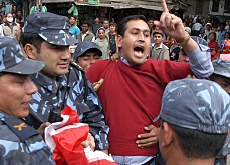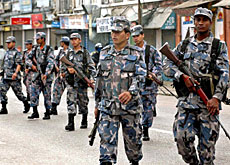Switzerland cuts back aid projects in Nepal

Swiss aid projects have been significantly reduced in Nepal due to uncertainty in the Himalayan kingdom after the king seized control of the country last month.
The cutbacks come at a time when the United Nations and other bilateral donors are warning that Nepal is on the brink of a humanitarian crisis.
On February 1 King Gyanendra imposed emergency rule, seizing absolute power and drastically reducing press freedom.
“We are working in an environment which is partially unreal, as what we read and see in the capital Kathmandu is very different from the information we are getting from the field,” Jörg Frieden, country director of the Swiss Agency for Development and Cooperation (SDC) in Nepal, told swissinfo.
“The situation here is very difficult to analyse as we lack proper information, and our government partners are presenting an image of the situation that we do not consider to be the right one.”
Military censors
There have been no independent radio reports of the situation within the country since the king dismissed the government. Newspaper and television offices have had regular visits from military censors bearing warnings not to criticise the royal takeover.
“I think the picture you get abroad is probably more accurate than the one we get in Nepal as the information there is uncensored,” added Frieden.
“The picture we get in Kathmandu is a rosy one that does not correspond with the reality of escalating conflict and increased insecurity.”
King Gyanendra justified his move by blaming the ex-prime minister Sher Bahadur Deuba and his government for not doing enough to tackle the Maoist insurgency. More than 10,000 people have been killed in the conflict since 1996.
The situation in Kathmandu, however, seems pretty calm and some people even say they are hoping that the king’s move will bring about a positive change in the country.
“People are relieved and they feel more secure. I don’t think there is any reason for the people from the West to panic about the situation in Nepal. Uncertainty is diminishing and I think we are moving towards a better situation,” Suman Pandey of Explore Himalaya, the sixth-biggest trekking agency in Kathmandu, told swissinfo.
Improved situation
A recent poll conducted by Interdisciplinary Analysts, a Nepalese think tank, showed that 47.2 per cent of the population think the situation in their country has improved whereas 36.4 per cent feel it has become worse.
The poll also showed that 73 per cent think the conflict between government forces and Maoists could be resolved through talks; however, 62 per cent do not believe the rebels are serious about peace.
The situation for villagers is, according to Frieden, extremely serious as blockades have made the movement of people and goods very difficult all over the country.
“We see that in some areas supplies are difficult to provide so we consider the situation to be very fragile. If the present military stalemate is broken then the danger of suffering will be very high.”
Priority country
Nepal has been a priority country for the SDC for more than 40 years. But since the king seized power, Switzerland has reduced its aid projects and has put a stop to new engagements in the country.
“We are now operating at about 45 to 50 per cent of our work. It is a percentage that reflects the difficulties of working in the field, and the political conflict is very acute in rural areas,” said Frieden.
“We can actually only operate if the conflicting parties, the Maoists and security forces, consider our work to be in their favour or at least not to be against them.”
Frieden pointed out that one of Nepal’s main problems was that people in the countryside were defenceless and often had to give in to the Maoists.
Tourists safe
Explore Himalaya’s Pandey said westerners had nothing to fear from the conflict and were not a target for the rebels.
“Nepal is as safe as it was before. During the nine years of insurgency there has not been a single incident in which a tourist was attacked. The situation for tourists has not become worse – it has become better,” he said.
Switzerland says it will monitor the current situation and re-evaluate its engagement in the Himalayan kingdom in May this year.
“The option for us to pull out of Nepal completely is there but it is certainly not our first choice. We are currently trying to understand how much the country has changed after the royal initiative and we are reconsidering our operations to make sure resources and benefits are better in line with the people’s needs,” said Frieden.
swissinfo, Billi Bierling in Kathmandu
King Gyanendra sacked the multi-party government on February 1, seized power and declared a state of emergency.
The king called for international support for Nepal’s fight against terrorism.
Press freedom has been curbed and military censors have made regular visits to newspaper and television offices.
The Maoists have been fighting to topple the monarchy since 1996.

In compliance with the JTI standards
More: SWI swissinfo.ch certified by the Journalism Trust Initiative


You can find an overview of ongoing debates with our journalists here . Please join us!
If you want to start a conversation about a topic raised in this article or want to report factual errors, email us at english@swissinfo.ch.